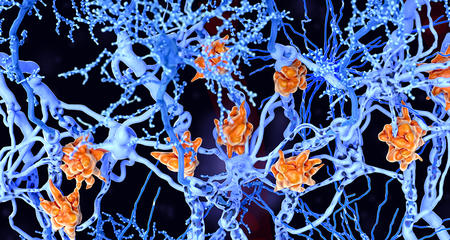Diagnosing MS can be challenging because there is not a single test to determine if a person has MS. Your health care provider will perform a variety of tests to evaluate mental, emotional, physical and cognitive function. A medical history, a neurologic exam and various tests, including magnetic resonance imaging (MRI), evoked potentials (EP) and spinal fluid analysis, may be used. Blood tests may also be used to rule out other diagnoses.
MS symptoms can come and go, which can make it challenging to make an accurate diagnosis.
In order to make a diagnosis of MS, the physician may go through these steps.
- Show two or more separate damaged areas of the central nervous system — brain, spinal cord and optic nerves.
- Show damage in two or more places that happened one or more months apart.
- Rule out all other possible diagnoses.
If a person has a single episode of MS-like symptom(s) lasting at least 24 hours, that person is said to have clinically-isolated syndrome (CIS). A person with CIS may or may not develop MS.
If you are diagnosed with MS, will evaluate your type of MS and your MS symptoms to develop the MS treatment plan that is right for you.
Multiple Sclerosis Treatment
There is no cure for MS so the goal is to modify or change the disease course, treat relapses and manage MS symptoms.
Treatment for multiple sclerosis symptoms is tailored to your specific needs. MS is a complex disease that requires expertise from many different healthcare professionals. All of those experts contribute in a unique way. Managing MS and the symptoms may help improve quality of life and increase comfort.
Modifying the Disease
Medications are used to modify or change the disease course, treat relapses and manage symptoms. The following may be options for those with relapsing forms of MS.
- Injectable medications
- Oral medications
- Infused medications
In addition to managing the disease, we manage the symptoms that can affect all areas of your body. These symptoms include:
- Bladder or bowel problems
- Depression
- Dizziness or vertigo
- Emotional changes
- Fatigue
- Itching
- Pain
- Sexual problems
- Spasticity
- Tremors
- Walking difficulties
Managing MS Relapses
A relapse, or "flare up" is called an exacerbation. An exacerbation of MS can cause new symptoms or the worsening of old symptoms. Exacerbations are unique to every individual. There can be only one symptom while others may cause two or more symptoms. They can be very mild, or severe enough to interfere with a person’s ability to function at home and at work.
Exacerbations are caused by inflammation in the central nervous system (CNS). The inflammation damages the myelin which slows or disrupts the transmission of nerve impulses. This causes the symptoms of MS. A true exacerbation, must last at least 24 hours and be separated from the previous attack by at least 30 days. Most exacerbations last from a few days to several weeks or even months.
Not all exacerbations require treatment. Mild symptoms (such as numbness, pins-and-needle sensation, or bursts of fatigue) that don’t significantly impact a person’s activities can generally be left to get better on their own.
Severe exacerbations (involving loss of vision, severe weakness or poor balance, for example) which interfere with a person’s mobility, safety or overall ability to function, may require a short course of high-dose corticosteroids to reduce the inflammation and bring the relapse to an end more quickly.
The most common treatment regimens are:
- Solu-Medrol® (methylprednisolone) — A three- to five-day course of intravenous medication
- Deltasone® (prednisone) — A high-dose oral medication.
Other treatment options:
- H.P. Acthar Gel (ACTH) — An option for those who are unable to cope with the side effects of high-dose corticosteroids, have been treated unsuccessfully with corticosteroids, do not have access to intravenous therapy, or have trouble receiving medication intravenously because of difficulty accessing the veins.
- Plasmapheresis — Plasma exchange may be considered for the 10 percent of very severe exacerbations that do not respond adequately to the standard steroid treatment.
Lifestyle Changes for MS Patients
In addition to managing your MS, it is very important to take care of yourself. We encourage you to consider conventional medicine options, as well as alternative (or complimentary) options.
- Follow a healthy diet: Many MS specialists recommend following a heart-healthy, high-fiber, low-fat diet.
- Stay active: Regular exercise has many health benefits. Talk to your health care team about a plan that is best for you.
- Manage stress: Consider activities that improve your well-being.
- Other alternative interventions: Includes Vitamin D, acupuncture, and cooling strategies.
Behavioral Health Services
Taking care of your mental and emotional well-being is as important as caring for your physical health. In fact, the two are connected and should be considered together as part of your overall health. Both your mind and body directly impact your quality of life. Taking care of your mental health can help you lead a healthier life.
SilverCloud
Your doctor can prescribe SilverCloud, an online program, as part of your treatment plan. SilverCloud is based on more than 12 years of research to help people improve how they think, feel and respond to distress. Ask your provider if SilverCloud would be appropriate for you. https://www.froedtert.com/silvercloud
Virtual Visits Are Available
Safe and convenient virtual visits by video let you get the care you need via a mobile device, tablet or computer wherever you are. We'll assess your condition and develop a treatment plan right away. To schedule a virtual visit, call 414-777-7700.


